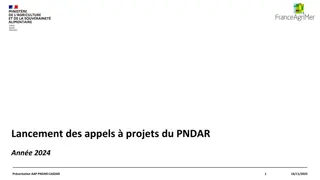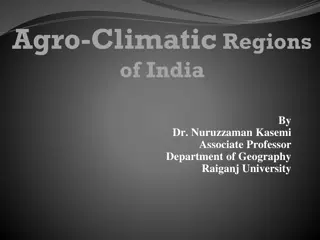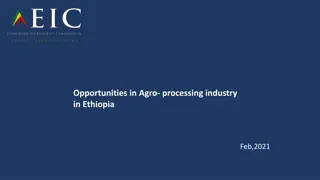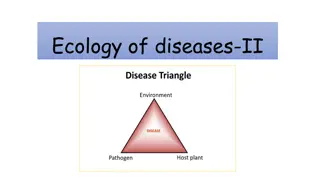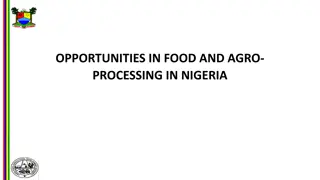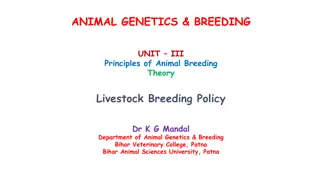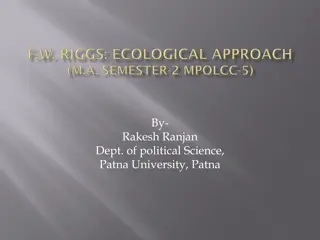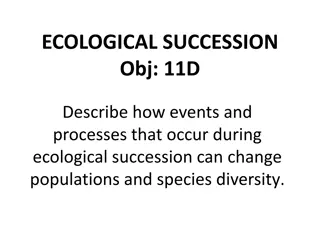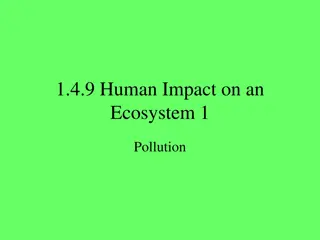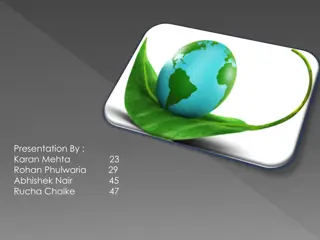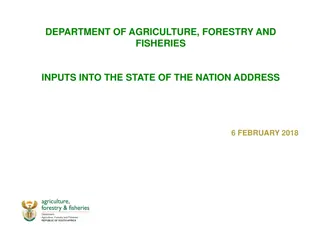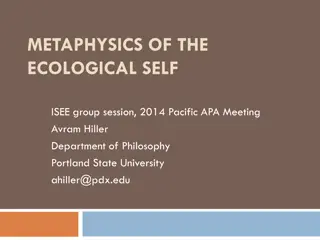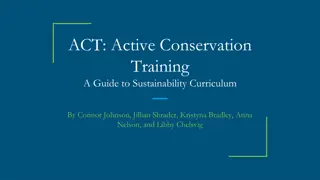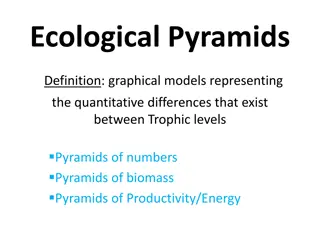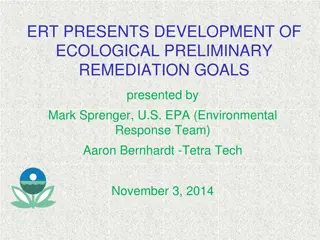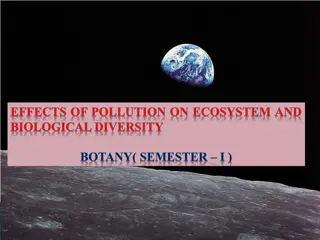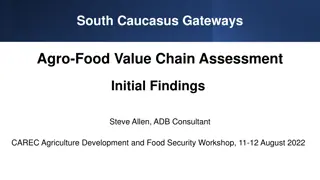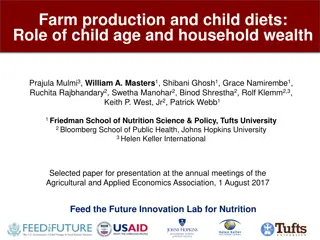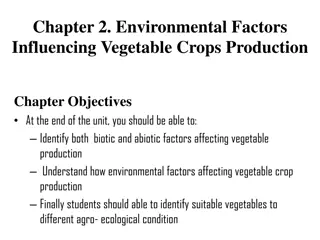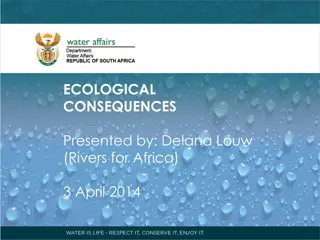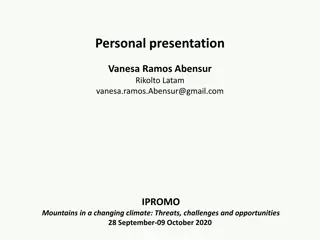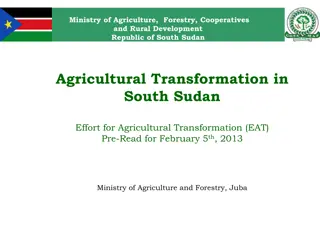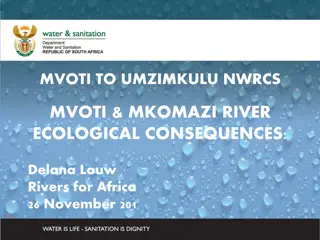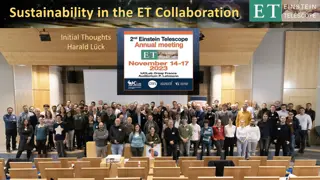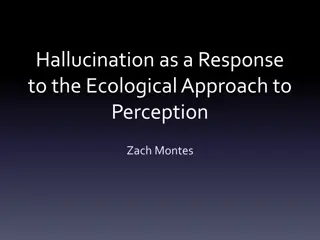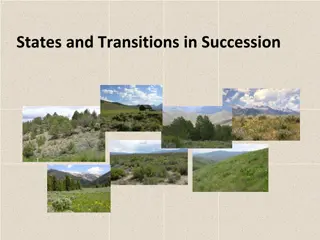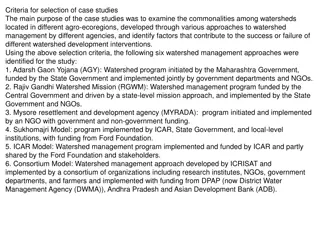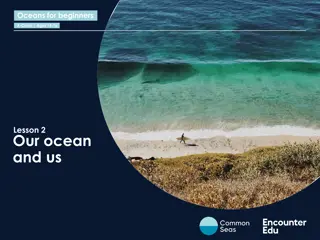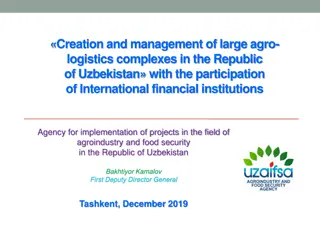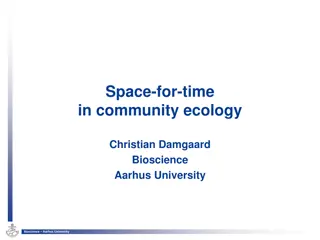Trends in Agro-Food Logistics Management
Explore emerging trends in global agro-food logistics and supply chains, including disruptions, implications, and opportunities. Learn about challenges like food losses, regulatory changes, resistance to GMOs, and more. Gain insights into the changing landscape of food systems.
2 views • 24 slides
Priority Themes for PNDAR Projects in 2024: Mobilizing for Agricultural and Rural Development
The PNDAR program for 2024 aims to mobilize stakeholders in agricultural and rural development to accelerate the agro-ecological transition. Key priorities include enhancing research, development, and innovation to drive sustainable transitions, supporting collective methods for innovation, and prom
5 views • 28 slides
Understanding Models with False Positive Detections in Occupancy Modeling
Explore the importance of addressing false positives in occupancy modeling, potential biases caused by them, methods to mitigate errors, and the extension of basic occupancy models to allow for false positives. Key concepts such as the Royle-Link model and the integration of classification processes
11 views • 33 slides
Overview of Ecological Studies in Epidemiology
Ecological studies in epidemiology involve studying groups of individuals at a population level to examine the correlation between exposure and disease occurrence. While cost-effective and useful for generating hypotheses, ecological studies have limitations, such as the inability to control for con
3 views • 21 slides
Understanding Ecological Relationships and Food Chains
Explore the intricate ecological relationships in nature, including population dynamics, producer-consumer systems, and different types of consumers like herbivores, carnivores, and decomposers. Learn about food chains, food webs, and the interconnectedness of organisms in ecosystems through informa
0 views • 38 slides
Agro-Climatic Regions of India: Overview and Objectives
Explore the delineation and characteristics of agro-climatic regions in India, based on geo-climatic and socio-economic variations. Learn about the objectives focusing on agricultural production, farm income, rural employment, and regional development.
0 views • 27 slides
Opportunities in Ethiopia's Agro-Processing Industry
Ethiopia stands out as a leader in raw material production for agro-processing industries, offering opportunities in dairy, juice processing, edible oil processing, poultry, beef production, and tomato processing. With abundant resources, suitable climate conditions, and a growing domestic market, E
0 views • 8 slides
Understanding Ecosystems and Disease Ecology
Explore the diverse types of ecosystems, including autochthonous, anthropurgic, and synanthropic ecosystems, and their impact on disease ecology. Learn about biotopes, biocenosis, ecological mosaics, and ecological interfaces, and discover how infectious diseases can be transmitted across these inte
0 views • 10 slides
Understanding Landscape Architecture: Designing Outdoor Environments
Landscape architecture involves the art and practice of designing outdoor spaces to harmonize with buildings, roads, and natural surroundings. It is a comprehensive discipline that encompasses land analysis, planning, design, management, and preservation, creating healthy and enjoyable spaces for th
1 views • 23 slides
Unlocking Opportunities in Food and Agro-Processing in Nigeria
Explore the potential for food and agro-processing in Nigeria to generate income, enhance food security, and boost the economy. Learn about the objectives, strategies, and reasons behind agro-processing activities, as well as the growing demand for convenience and processed foods in the country. Dis
2 views • 46 slides
Livestock Breeding Policy for Genetic Improvement of Cattle and Buffalo in India
India's diverse agro-ecological regions host a wide range of farm animal breeds. The livestock breeding policy aims to enhance the productivity of cattle and buffalo through strategies such as grading up with indigenous superior dairy breeds, crossbreeding with high-yielding exotic breeds, and selec
1 views • 23 slides
The Ecological Approach in Comparative Public Administration
Fred W. Riggs, a proponent of the Ecological Approach in Public Administration, emphasized the importance of understanding the interaction between administrative systems and their external surroundings. He introduced the Fused-Prismatic-Diffracted Model to explore the unique contexts of developing c
0 views • 21 slides
Understanding Ecological Succession and Its Impacts
Ecological succession is the orderly process of change in an ecosystem, where one community replaces another until a stable climax is reached. This progression affects populations and species diversity. The process involves primary and secondary succession, with events like tornadoes, hurricanes, an
0 views • 23 slides
Understanding Pollution and its Ecological Impact
Pollution is any human addition to the environment that disrupts the ecosystem's ability to sustain life. This includes pollutants like CO2 and chemicals from various sources that harm air, water, and land. Different types of pollution such as industrial, agricultural, and domestic pollution have ad
0 views • 25 slides
Understanding the Relationship Between Ecology and Business
Ecology and business have a complex relationship where human activities impact the ecological environment, and in turn, the environment influences our quality of life. Maintaining ecological balance is crucial for sustainable development, and businesses play a significant role in ensuring environmen
0 views • 19 slides
Understanding Ecological Niches in Advanced Biology
In Advanced Higher Biology, the concept of ecological niches is explored in depth, considering both abiotic and biotic factors that impact an organism's role in its environment. The fundamental and realized niches are distinguished, along with the Competitive Exclusion Principle and examples like sq
4 views • 18 slides
Agriculture, Forestry, and Fisheries: State of the Nation Address 2018 Review
The Department of Agriculture, Forestry, and Fisheries presented insights into the state of the nation in 2018, focusing on the revitalization of the agriculture and agro-processing value chain. Key challenges discussed include land transfer, declining household involvement in agriculture, and input
0 views • 21 slides
Understanding the Concept of Population and Unit Stock
The concept of population revolves around all organisms of the same species living in a specific area capable of interbreeding. It is essential to differentiate between sample populations and real populations to accurately study their attributes such as birth rates, death rates, and spatial dimensio
0 views • 15 slides
Metaphysics of the Ecological Self and Monism in Philosophy
The discussion explores the concept of the ecological self in deep ecology and the interplay with contemporary analytic philosophies like monism. It proposes a moderate view that acknowledges internal dependence relations between humans and the environment, grounding normative claims about human-env
2 views • 29 slides
Interactive Sustainability Curriculum for Conservation Training
Engage students in activities focusing on energy, agriculture, waste management, animals and ecosystems, consumption, and other sustainability topics. Lessons include understanding energy sources, land degradation, waste sorting, nature walks, tote bag making, and ecological footprints. Encourage cr
0 views • 7 slides
Understanding Ecological Pyramids: Models of Trophic Relationships
Ecological pyramids are graphical models that depict quantitative differences between trophic levels in an ecosystem. They come in three types: Pyramids of Numbers, Pyramids of Biomass, and Pyramids of Productivity/Energy. Pyramids of Numbers show the number of organisms at each trophic level, Pyram
0 views • 4 slides
Understanding Energy Flow in Ecosystems: A Visual Guide
Explore the intricate dynamics of energy flow in ecosystems through a collection of visually engaging images depicting autotrophs, heterotrophs, food chains, ecological pyramids, and more. Dive into the concept of trophic levels, food webs, and feeding relationships, unraveling the journey of energy
0 views • 13 slides
Eco-Remediation Goals Development Training Overview
This presentation by Mark Sprenger from the U.S. EPA discusses the development of Ecological Preliminary Remediation Goals (PRGs). It covers the process steps, assumptions, risk information activities, and resources related to ecological risk assessment within the EPA's programs. The training module
0 views • 53 slides
Enhancing Ecological Sustainability through Gamified Machine Learning
Improving human-computer interactions with gamification can help understand ecological sustainability better by parameterizing complex models. Allometric Trophic Network models analyze energy flow and biomass dynamics, but face challenges in parameterization. The Convergence Game in World of Balance
0 views • 12 slides
Understanding Biological Diversity and Ecological Organization
Exploring the intricate balance of flora and fauna on our planet, this content delves into the vast array of plant and animal species coexisting in various ecosystems. It discusses the significance of biodiversity, the interaction of biotic and abiotic components in ecological systems, and the ecolo
0 views • 41 slides
South Caucasus Gateways Agro-Food Value Chain Assessment Overview
ADB's South Caucasus Gateways project aims to enhance agro-food value chains in Georgia, Azerbaijan, and Armenia, promoting food security and increasing exports. The assessment focuses on trade flows, logistics, and infrastructure investments to improve commercial food supply chains, benefiting farm
0 views • 9 slides
Role of Farm Production in Child Diet Quality
A study explores the connection between family food production and child diet quality, focusing on the impact of child age and household wealth. Findings suggest that farm production is linked to children's intake, especially in poorer households and for older children. Dataset analysis from PoSHAN
0 views • 26 slides
Environmental Factors Influencing Vegetable Crops Production
Understanding the impact of environmental factors on vegetable production is crucial for maximizing yield and quality. This chapter focuses on identifying both biotic and abiotic factors affecting vegetables, the significance of agro-ecological conditions, and the role of climatic elements in vegeta
0 views • 87 slides
Understanding Ecological Consequences in Ecosystem Management
Delana Louw from Rivers for Africa presented on the ecological consequences of various scenarios in ecosystem management. The process involves delineating units of analysis, stakeholder engagement, quantifying ecological water requirements, evaluating scenarios, and determining management classes. B
0 views • 14 slides
Challenges in Promoting Organic Farming in India
The agro-ecological movement in India faces challenges in scaling up organic farming due to limited government support, lack of scientific consensus, and reliance on chemical-intensive agriculture. Despite some initiatives like the Paramparagat Krishi Vikas Yojana, implementation remains suboptimal.
0 views • 35 slides
Research Projects on Agroecology and Climate Change Resilience
Vanesa Ramos Abensur is a Ph.D. candidate focusing on agro-ecological initiatives in the Andean region, exploring strategies of Quechua communities to combat climate change and preserve agrobiodiversity. She co-organized the Latin-American School for Food Systems Resilience in 2019, emphasizing co-l
0 views • 7 slides
Agricultural Transformation in South Sudan: Efforts Towards a Hunger-Free Nation
The Ministry of Agriculture, Forestry, Cooperatives, and Rural Development in South Sudan is spearheading an Agricultural Transformation effort to achieve a hunger-free nation. This involves national food independence, improved health and nutrition, economic growth through agriculture, increased inc
0 views • 11 slides
Ecological Consequences Assessment for Conservation Areas
Determining the ecological consequences of various scenarios is crucial for conservation efforts. The assessment focuses on changes in geomorphology, physico-chemical properties, fish populations, macroinvertebrates, and riparian vegetation. By evaluating scenarios based on ecological significance,
0 views • 11 slides
Sustainability Challenges in ET Collaboration: Addressing Ecological and Non-Ecological Aspects
The ET Collaboration is realizing the importance of sustainability, encompassing ecological and non-ecological aspects. Issues include balancing energy consumption and hardware longevity, remote access possibilities, funding sustainability, social partnerships, and designing instruments with sustain
0 views • 5 slides
Understanding Hallucinations through Ecological Perception and Neurological Evidence
Exploring the phenomenon of hallucinations in relation to the ecological approach to perception, direct vs. indirect realism, and the concept of affordances in visual perception. Delving into the types of hallucinations, such as visual and complex hallucinations, and conditions like Charles Bonnet S
1 views • 16 slides
Understanding Plant Community Succession and Ecological Transitions
Explore the dynamic process of plant community succession, from pioneer stages to climax communities, and the intricate patterns of transitions in ecological systems. Discover the variability and stability of different states within ecosystems, highlighting the complexities of natural ecological dyn
0 views • 14 slides
Analysis of Different Watershed Management Approaches in Various Agro-Ecoregions
This study examines six different watershed management approaches implemented in diverse agro-ecoregions, focusing on the commonalities, success, and failures of interventions. The case study of Adarsh Gaon Yojana (AGY) in Maharashtra highlights the principles and approach towards sustainable villag
0 views • 13 slides
Understanding Ecological Goods and Services from Our Oceans
Explore the importance of ecological goods and services provided by oceans in Lesson 2 of the Oceans for Beginners curriculum. Learn about the tangible products, benefits, and services derived from ocean ecosystems, and reflect on their significance. Understand the categories of ecological services
0 views • 15 slides
Implementation of Large Agro-Logistics Complexes in Uzbekistan
The Republic of Uzbekistan is focusing on creating and managing large agro-logistics complexes to enhance food security and agribusiness development. Government programs and international financial institutions are instrumental in funding and implementing these projects, aiming to increase agricultu
0 views • 13 slides
Understanding Space-for-Time Substitution in Community Ecology
Space-for-time substitution (SFT) is a method used to study slow ecological processes by assuming different sites are at various stages of development. This approach, famous for its role in ecological development, has been critiqued for its implicit use in testing hypotheses on ecological processes
0 views • 7 slides

